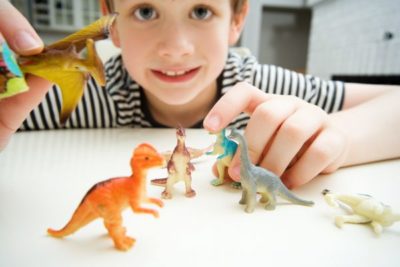Have you ever met a dinosaur named “Diverticulitis?” Six year old Ashton came into the DCC Office. He proudly introduced his new toy plastic dinosaur to one of our nurses as “Diverticulitis.” He carefully pronounced every syllable.

Brave dinosaur beat Diverticulitis!
No one knows where he first heard the name of his this favorite toy. But the DCC staff is pretty sure it had something to do with Grandma. She came to the office with him and his mother.
She had been diagnosed earlier with diverticulosis. More recently, she suffered an attack of acute diverticulitis. A second flare-up was followed by a successful emergency surgery.
It is a happy re-check, but let’s back-track from this moment. We will review the symptoms and some myths in connection with this all-too-common disease.
Diverticulosis vs. Diverticulitis
The fact of the matter is, normally we do not hear patients or families who are familiar with the term “diverticulosis.” More often we hear patients speak of diverticulitis. They confuse it with diverticulosis. So what is the difference between diverticulitis and diverticulosis?
In the first place, DDC wants you to know that the diverticuli are small bulges, like blisters. These little pouches, typically form like small puffy sacs in the lining of the intestines.
Usually they position themselves in the low part of the large colon. The formation of these little pouches is a condition termed diverticulosis.
According to the American College of Gastroenterology, “Diverticulosis is a common disorder, especially in older people. The condition is uncommon in people under the age of 30 years of age.” It is “most common in those over 60. Diverticulosis may be somewhat more common in men than in women.”
Basically, one out of ten people over the age of 40 stand a very good chance of developing diverticulosis. Chances are also good that you will never know you have diverticulosis, unless you have a CT Scan or a colonoscopy. The most important point we want to make is that most Patients with diverticulosis have no symptoms, or pain. But they are at risk for diverticulitis.
Diverticulitis: Much More Significant Than Diverticulosis
Problems occur when the diverticuli, these little pouches on the wall of the intestine, become inflamed, irritated or infected. That’s when your primary care doctor or our doctors at DDC typically diagnose a condition known “diverticulitis.” According to numerous patient reports and experts at Mayo Clinic, diverticulitis can cause several symptoms. They range from miserable to acute.
Signs and Symptoms: The Ugly Truths!
A person suffering from Diverticulitis will demonstrate any combination of these symptoms and signs:
Severe abdominal pain, Cramping, Constipation, Diarrhea, And Bloating.
Diverticulitis Myth Number One:
Some people still believe that every diagnosis of diverticulitis mandates Surgery. Quite the Opposite is the truth. Keep in mind that not every case is a surgical one. Not everyone with diverticulitis is sent to the operating room.
The Mayo Clinic reports, “Mild diverticulitis can be treated with rest, changes in your diet and antibiotics. Severe or recurring diverticulitis may require surgery.”
Diverticulitis Myth Number Two:
Sometimes patients tell us they had previous flare ups. They fear that the next time, it is sure to perforate and leave them with peritonitis. Again, this is a traditional belief, but unfounded in research. Actually, subsequent flare-ups are more likely to be on a plateau with your previous ones.
Anti-Myth Facts to Remember
- Diverticulitis only affects 10 – 25 percent of patients with diverticulosis.
- 75 percent of those cases will only require medicine or outpatient treatment.
Diverticulitis and Possible Complication
That remaining 25 percent of cases might present a few more alarming symptoms. With very severe diverticulitis, you might have rectal bleeding, abdominal infections and colon obstructions.
1. The little pockets known as diverticuli, can become blocked with stool, and inflamed or infected. Real problems result when these pockets rupture. That’s when bacteria that are normally in and confined to feces, are released into the abdominal area. The patient might suffer invasive infection with pain and high fever.
2. In another scenario, the bacteria could become “walled-off,” by the body and result in an abscess.

Grandma beat Diverticulitis!
3. In a worst case scenario, peritonitis can occur. This is a potentially fatal infection lodged in the abdominal cavity and it must be immediately treated.
Diverticulitis Myth Number Three:
One of the biggest myths about diverticular disease is that patients with light cases and without surgery, must avoid nuts, seeds and popcorn. At Cleveland Clinic, experts refute this as a particularly persistent and peculiar myth.
Today, most doctors believe forbidding seeds, nuts and pop-corn to be in complete opposition to the foods on the usual healthy, high-fiber diet they recommend.
The dietary restriction of seeds, nuts and pop-corn is very traditional, yet it is unfounded in scientific evidence.
Experts at Cleveland Health Clinic remarked, “We used to think that a seed or nut plugged the pocket in the colon and that’s what caused it to become inflamed or to rupture. But no surgeon has ever seen that, and studies have strongly suggested there’s nothing to that idea.”
At the same time, and just so there will be no confusion, we caution you. Peanuts will not be a good choice of foods immediately after surgery for diverticulitis–or during a flare-up of the condition.
Diverticulitis: Conquering the Dinosaur Without Myths
To return you to our opening scenario with six-year old Ashton and his plastic dinosaur, we see Grandma is beaming. She has managed her surgery well. And Grandma continues to thrive on life in spite of her bouts of diverticulitis.

Have you ever met a dinosaur named “Diverticulitis?”
We had to ask him why he named his cartoon-faced dinosaur “Diverticulitis.” He looked at us wisely with a precocious glint in his eye. He grinned, “Don’t you see the dinosaur’s smile? Don’t you think he’s got a cute one?
As they leave, hand in hand, he audaciously turns his head over his shoulder and actually says, “Get it?”
We do. “Acute Diverticulitis”—like Grandma had. A big thing, but with treatment, not a monster at all.
Thank you for reading our blog post from DDC Orlando. We hope you return for more diverticulitis information in our next blog!
